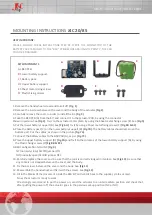interrupt from a bus master or bus slave clocked by the system clock, or a synchronous
interrupt from a bus slave clocked by the bus clock. If configured, a DMA request (using
the asynchronous DMA wakeup) can also be used to exit Partial Stop for the duration of a
DMA transfer before the device is transitioned back into PSTOP2.
Any AWIC interrupt can be used as a wake up source from Stop (normal Stop and VLPS)
mode. See
for all the available wake up source. Besides waking up the CPU
from Stop mode, the DMA can perform data transfer while retaining the CPU in Low
Power mode.
24.2.3.2 DMA Wakeup
The DMA can be configured to wake the device on a DMA request whenever it is placed
in Stop mode. The wake-up is configured per DMA channel and is supported in Compute
Operation, PSTOP, STOP, and VLPS low power modes.
When a DMA wake-up is detected in PSTOP, STOP or VLPS then the device will initiate
a normal exit from the low power mode. This can include restoring the on-chip regulator
and internal power switches, enabling the clock generators in the SCG, enabling the
system and bus clocks (but not the core clock) and negating the stop mode signal to the
bus masters and bus slaves. The only difference is that the CPU will remain in the low
power mode with the CPU clock disabled.
During Compute Operation, a DMA wake-up will initiate a normal exit from Compute
Operation. This includes enabling the clocks and negating the stop mode signal to the bus
masters and bus slaves. The core clock always remains enabled during Compute
Operation.
Since the DMA wakeup will enable the clocks and negate the stop mode signals to all bus
masters and slaves, software needs to ensure that bus masters and slaves that are not
involved with the DMA wake-up and transfer remain in a known state. That can be
accomplished by disabling the modules before entry into the low power mode or by
setting the Doze enable bit in selected modules.
Once the DMA request that initiated the wake-up negates and the DMA completes the
current transfer, the device will transition back to the original low-power mode. This
includes requesting all non-CPU bus masters to enter Stop mode and then requesting bus
slaves to enter Stop mode. In STOP and VLPS modes, SCG and PMC would then also
enter their appropriate modes.
Power Modes Description
Kinetis KE1xZ256 Sub-Family Reference Manual, Rev. 3, 07/2018
552
NXP Semiconductors
Summary of Contents for Kinetis KE1xZ256
Page 2: ...Kinetis KE1xZ256 Sub Family Reference Manual Rev 3 07 2018 2 NXP Semiconductors...
Page 178: ...Usage Guide Kinetis KE1xZ256 Sub Family Reference Manual Rev 3 07 2018 178 NXP Semiconductors...
Page 356: ...Usage Guide Kinetis KE1xZ256 Sub Family Reference Manual Rev 3 07 2018 356 NXP Semiconductors...
Page 410: ...Interrupts Kinetis KE1xZ256 Sub Family Reference Manual Rev 3 07 2018 410 NXP Semiconductors...
Page 604: ...Usage Guide Kinetis KE1xZ256 Sub Family Reference Manual Rev 3 07 2018 604 NXP Semiconductors...
Page 634: ...Usage Guide Kinetis KE1xZ256 Sub Family Reference Manual Rev 3 07 2018 634 NXP Semiconductors...
Page 674: ...Usage Guide Kinetis KE1xZ256 Sub Family Reference Manual Rev 3 07 2018 674 NXP Semiconductors...
Page 820: ...Usage Guide Kinetis KE1xZ256 Sub Family Reference Manual Rev 3 07 2018 820 NXP Semiconductors...
Page 1030: ...Usage Guide Kinetis KE1xZ256 Sub Family Reference Manual Rev 3 07 2018 1030 NXP Semiconductors...
Page 1052: ...Usage Guide Kinetis KE1xZ256 Sub Family Reference Manual Rev 3 07 2018 1052 NXP Semiconductors...
Page 1066: ...Usage Guide Kinetis KE1xZ256 Sub Family Reference Manual Rev 3 07 2018 1066 NXP Semiconductors...
Page 1268: ...Usage Guide Kinetis KE1xZ256 Sub Family Reference Manual Rev 3 07 2018 1268 NXP Semiconductors...
Page 1314: ...Usage Guide Kinetis KE1xZ256 Sub Family Reference Manual Rev 3 07 2018 1314 NXP Semiconductors...
Page 1316: ...Kinetis KE1xZ256 Sub Family Reference Manual Rev 3 07 2018 1316 NXP Semiconductors...


















